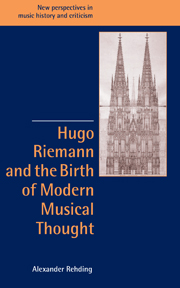Book contents
- Frontmatter
- Contents
- Acknowledgements
- Introduction
- 1 Hugo Riemann's moonshine experiment
- 2 The responsibilities of nineteenth-century music theory
- 3 Riemann's musical logic and the ‘As if’
- 4 Musical syntax, nationhood and universality
- 5 Beethoven's deafness, exotic harmonies and tone imaginations
- Epilogue
- Glossary: Riemann's key terms as explained in the Musik-Lexikon (5th edn, 1900)
- Bibliography
- Index
5 - Beethoven's deafness, exotic harmonies and tone imaginations
Published online by Cambridge University Press: 22 September 2009
- Frontmatter
- Contents
- Acknowledgements
- Introduction
- 1 Hugo Riemann's moonshine experiment
- 2 The responsibilities of nineteenth-century music theory
- 3 Riemann's musical logic and the ‘As if’
- 4 Musical syntax, nationhood and universality
- 5 Beethoven's deafness, exotic harmonies and tone imaginations
- Epilogue
- Glossary: Riemann's key terms as explained in the Musik-Lexikon (5th edn, 1900)
- Bibliography
- Index
Summary
Among Riemann's analyses of Beethoven's piano sonatas, one has come under particular criticism, and often serves as an example of the musicologist's insensitivity to music: the Sonata ‘quasi una fantasia’ in Eb major, Op. 27, no. 1. In this analysis, Riemann decided to rebar the first movement, almost in its entirety. On the face of it, there is of course something very blunt about this single-handed intrusion into the score. In fact, however, his decision to change the score is nothing but an expression of his ‘psychological turn’, and the changes that this initiated in Riemann's later musical thought.
Riemann's meddling with the score may have roused the critics, since most analysts have traditionally taken the score as the starting point for their analytical observations, on the assumption that it forms the most manifest link to the composer's thought. Witness, for instance, Heinrich Schenker's deep involvement with manuscripts, which is also expressed in his meticulous editions (which are in stark contrast to Riemann's own Phrasierungsausgaben, his edition with phrasing annotations, where editorial fidelity became subservient to pedagogical concerns). In Five Graphic Analyses, for instance, Schenker noted that in the autograph of Bach's C major prelude from the Well-Tempered Clavier, the stems of the bass line in one bar point up rather than down. He interpreted that as justification – derived from no less a figure than Bach himself – for his decision to omit this bar from his analysis.
- Type
- Chapter
- Information
- Hugo Riemann and the Birth of Modern Musical Thought , pp. 162 - 181Publisher: Cambridge University PressPrint publication year: 2003

